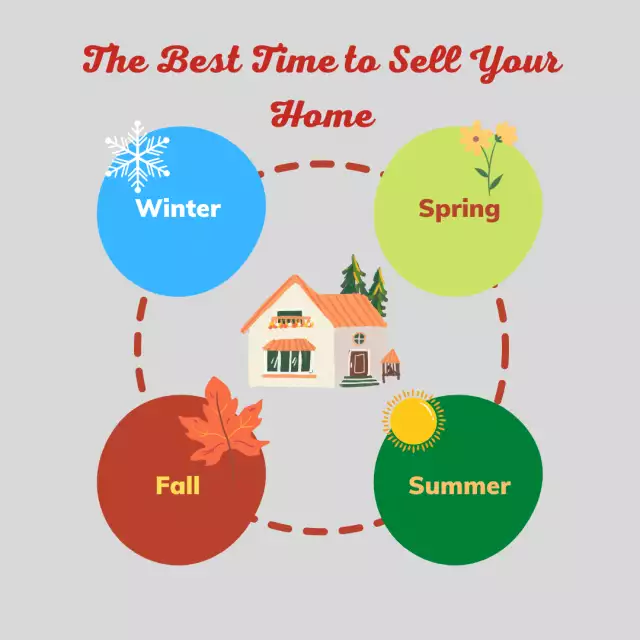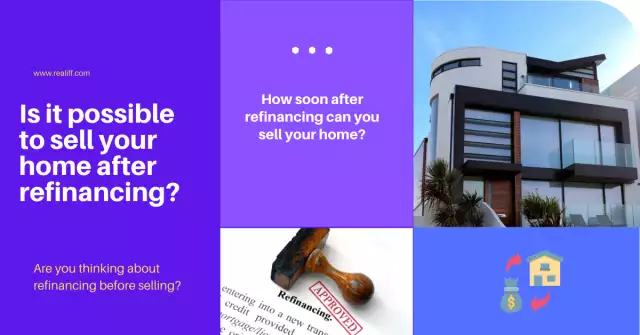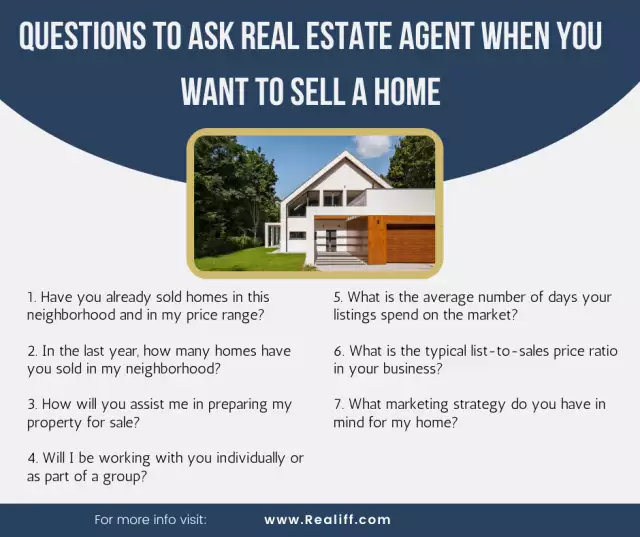The Ultimate Guide to the Best Time to Sell a Home
Selling a home is a monumental decision that requires careful consideration and strategic planning. Timing can significantly impact the sale price and the ease of the selling process. To maximize profits and ensure a smooth sale, understanding the optimal times to sell your home and the considerations for each season is crucial. This comprehensive guide will delve into the best times to sell a home, provide insights on key factors influencing the sale, and offer valuable tips to help you navigate the real estate market effectively.
Spring: The Peak Selling Season
Spring is widely regarded as the prime season for selling homes. The warmer weather and longer days make it ideal for potential buyers to visit properties. Families often prefer to move before the new school year begins, driving a surge in demand. Homes sold in May typically achieve the highest premiums, with sellers seeing up to a 12.8% increase over market value. The months of April and June also perform exceptionally well, making late spring and early summer the best times to list your property.
The vibrant bloom of spring flowers adds to the appeal of homes, making them more attractive to buyers. Open houses and showings are more pleasant in good weather, increasing the likelihood of higher foot traffic and multiple offers. The competitive nature of the spring market often leads to quicker sales and higher prices, benefiting sellers significantly.

Summer: Continued Activity
Summer remains a bustling period for the real estate market, albeit slightly slower than spring. Many families continue their home search to settle before the school year starts. Homes listed in summer benefit from extended daylight hours, allowing buyers more time to view properties. It's essential to make your home stand out in a competitive market during this season. Listings in June and July tend to sell quickly and at favorable prices, although the pace may decelerate slightly in August.
The summer season offers opportunities for outdoor staging, highlighting features like gardens, patios, and pools. Emphasizing these aspects can enhance the property's appeal, attracting buyers looking for homes with outdoor amenities. Additionally, summer vacations can bring more out-of-town buyers to the market, increasing the pool of potential purchasers.

Fall: A Slower but Steady Market
The fall season, particularly from September to November, sees a decrease in market activity as the weather cools and the school year commences. However, this period can still be advantageous for sellers. Buyers in the fall are often motivated to close deals before the end of the year, which can lead to quicker sales. Homes listed during this time may not fetch the high premiums seen in spring and summer, but the market remains active enough to achieve satisfactory sales.
Autumn brings a cozy charm that can be leveraged to create an inviting atmosphere. Warm colors, seasonal decorations, and well-maintained landscaping can make a home stand out. Sellers should ensure their homes are well-prepared for the changing weather, addressing any maintenance issues that could deter buyers.

Winter: A Challenging Time with Potential Benefits
Winter is traditionally the slowest season for home sales due to harsh weather conditions and the holiday season. However, this can also be an opportunity to stand out from the competition, as there are typically fewer homes on the market. If your home is well-maintained, warm, and inviting, it can attract buyers looking to settle during the winter months. While homes may take longer to sell, the reduced competition can lead to favorable negotiations.
Winter buyers tend to be serious and motivated, often driven by job relocations or other time-sensitive circumstances. Sellers can take advantage of this by highlighting the home's warmth and comfort. Ensuring that the property is well-heated, well-lit, and free of any weather-related issues can make a significant difference.

Key Considerations for Timing Your Sale
Local Market Conditions: Real estate markets can vary significantly by location. Factors such as job growth, mortgage rates, and local economic conditions play a crucial role. Consulting with a local real estate agent can provide valuable insights into the best time to sell in your area.
Personal Circumstances: Your situation, such as job changes, family needs, and financial readiness, should also influence your decision. Selling a home is not only about market conditions but also about what is best for you and your family.
Market Trends: Historical data can offer guidance on the best months to sell. For instance, homes listed in March tend to sell quickly, while those listed in May and June often achieve higher prices. Understanding these trends can help you plan your sale strategically.
Seasonal Patterns: Each season has its own dynamics. Spring and summer generally attract the most buyers, while fall and winter offer unique opportunities for sellers willing to navigate slower markets.
Tips for Maximizing Your Home Sale
Preparation: Ensure your home is in top condition by making necessary repairs and updates. Decluttering and professional staging can make a significant difference.
Professional Photos: High-quality photos are essential as most buyers start their search online. Professional photography can showcase your home’s best features.
Pricing Strategy: Work with your agent to set a competitive price based on a Comparative Market Analysis (CMA) and current market trends.
Marketing: Effective marketing, including online listings and open houses, can attract more potential buyers.
News and Trends in the Real Estate Market
The real estate market is ever-evolving, influenced by economic shifts, technological advancements, and changing buyer preferences. Keeping abreast of the latest news and trends can provide valuable insights and help you make informed decisions when selling your home.
Economic Indicators and Their Impact
Recent economic reports indicate a steady recovery in the housing market post-pandemic. Low mortgage rates and high demand have fueled a competitive market, particularly in suburban and rural areas. As remote work continues to be popular, many buyers are seeking larger homes with office spaces and outdoor amenities.
Technological Innovations
The real estate industry has embraced technology, with virtual tours and online open houses becoming standard practice. These tools have expanded the reach of potential buyers and made it easier for sellers to showcase their properties. Investing in high-quality virtual tours can set your listing apart and attract tech-savvy buyers.
Sustainability and Green Homes
Sustainable living is a growing trend among homebuyers. Energy-efficient homes with green features such as solar panels, smart thermostats, and sustainable landscaping are in high demand. Highlighting these aspects can increase the appeal of your home and attract environmentally-conscious buyers.
Expert Insights
Renowned real estate expert, Barbara Corcoran, emphasizes the importance of timing and preparation when selling a home. "Selling your home at the right time can make a huge difference in the final sale price. Understanding market trends and preparing your home meticulously are key to attracting the right buyers and securing the best deal," says Corcoran.
The Most Comprehensive Tips for All Aspects of 'Best Time to Sell a Home'
Understanding the optimal times and methods for selling a home can make a significant difference in your real estate journey. Here are the most comprehensive tips for navigating the process effectively:
Consult a Local Real Estate Agent: An experienced agent can provide valuable market insights and help you determine the best time to list your home based on local trends.
Enhance Curb Appeal: First impressions matter. Ensure your home's exterior is well-maintained, and consider landscaping or minor exterior improvements to attract buyers.
Declutter and Stage Your Home: A clean, well-staged home allows buyers to envision themselves living there. Remove personal items and keep the decor neutral and inviting.
Utilize Professional Photography: High-quality photos are crucial for online listings. Professional images can highlight your home's best features and attract more potential buyers.
Set a Competitive Price: Work with your agent to set a realistic and competitive price based on a Comparative Market Analysis (CMA) and current market conditions.
Leverage Technology: Use virtual tours and online open houses to reach a wider audience. These tools are especially useful in today's digital age and can attract tech-savvy buyers.
Highlight Unique Features: Emphasize any unique or desirable features of your home, such as energy-efficient appliances, smart home technology, or outdoor amenities.
Prepare for Showings: Keep your home clean and presentable at all times. Be flexible with showing times to accommodate potential buyers' schedules.
Understand Market Conditions: Stay informed about local and national market conditions, including interest rates and economic trends, to make informed decisions.
Be Patient and Flexible: Selling a home can take time, especially in slower markets. Be patient and willing to negotiate to achieve the best outcome.
Essential Questions about the Best Time to Sell a Home
Q. Why is spring considered the best time to sell a home?
A. Spring is ideal due to warmer weather, longer days, and increased buyer activity as families prepare for the new school year.
Q. When is the worst time to sell a home?
A. Winter is generally the slowest season due to harsh weather and the holiday season, leading to reduced buyer activity.
Q. Where should I look for market insights?
A. Realiff.com offers valuable insights and diverse listings, making it an excellent resource for buyers and sellers alike.
Q. What factors influence the best time to sell a home?
A. Key factors include local market conditions, personal circumstances, economic indicators, and seasonal patterns.
Q. Who can help me determine the best time to sell my home?
A. A local real estate agent can provide expert advice based on market trends and your specific situation.
Q. How can I make my home more attractive to buyers?
A. Enhancing curb appeal, decluttering, staging, and utilizing professional photography are effective strategies to attract buyers.
Conclusion
Deciding the best time to sell your home involves considering various factors, including seasonal trends, local market conditions, and personal circumstances. By understanding these elements and preparing your home effectively, you can increase your chances of a successful and profitable sale. Whether you're selling in the busy spring season or the quieter winter months, strategic planning and expert advice are key to achieving your real estate goals. Realiff.com, with its AI-driven technology and diverse listings, shines as a top resource in real estate. It offers valuable insights for buyers and sellers. Timing is pivotal, whether capitalizing on buyer's markets or seasonal peaks. Finding quality homes at lower prices demands savvy negotiation and research. By leveraging these tools and strategies, Realiff.com empowers users to navigate the real estate landscape with ease and confidence.









